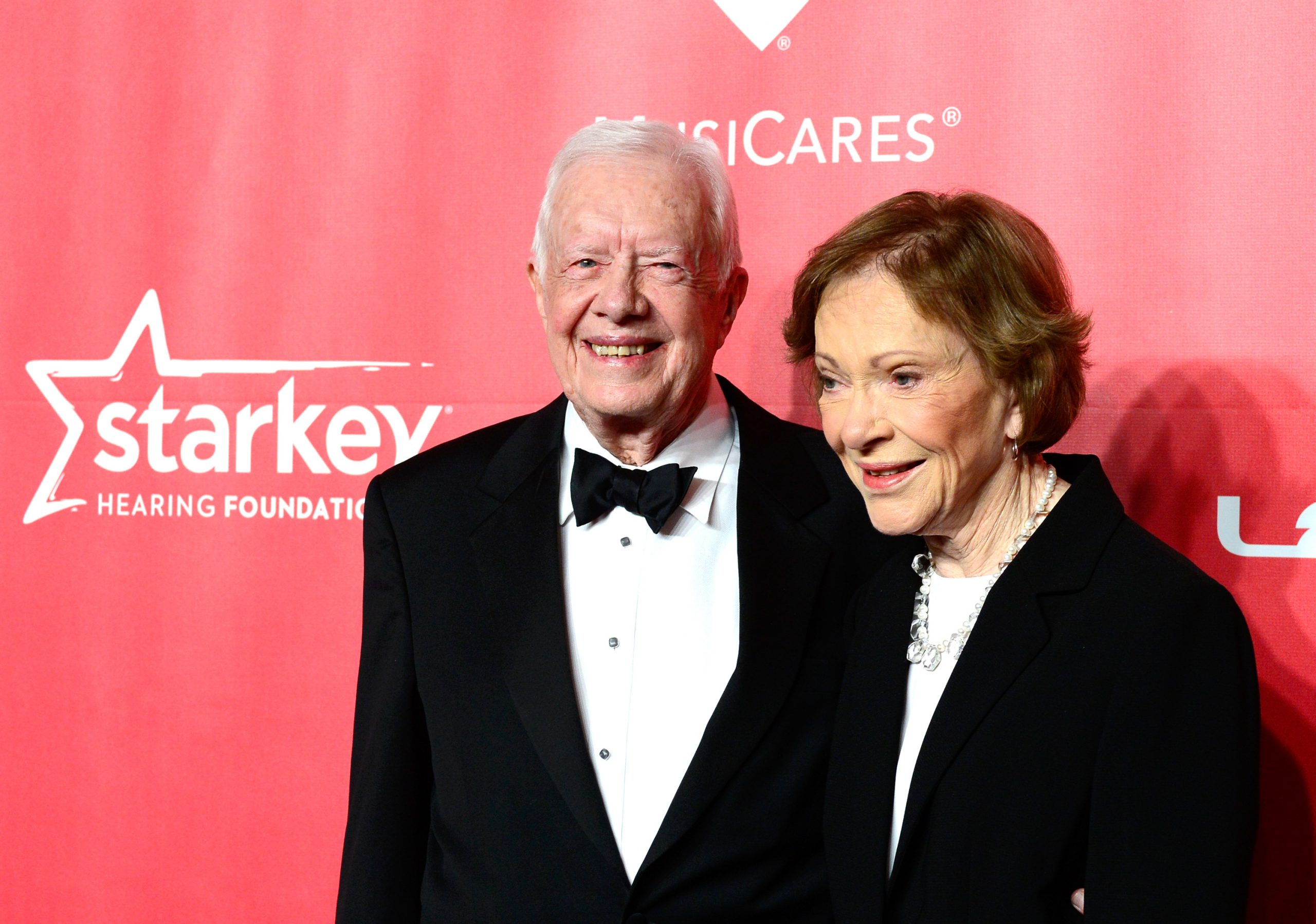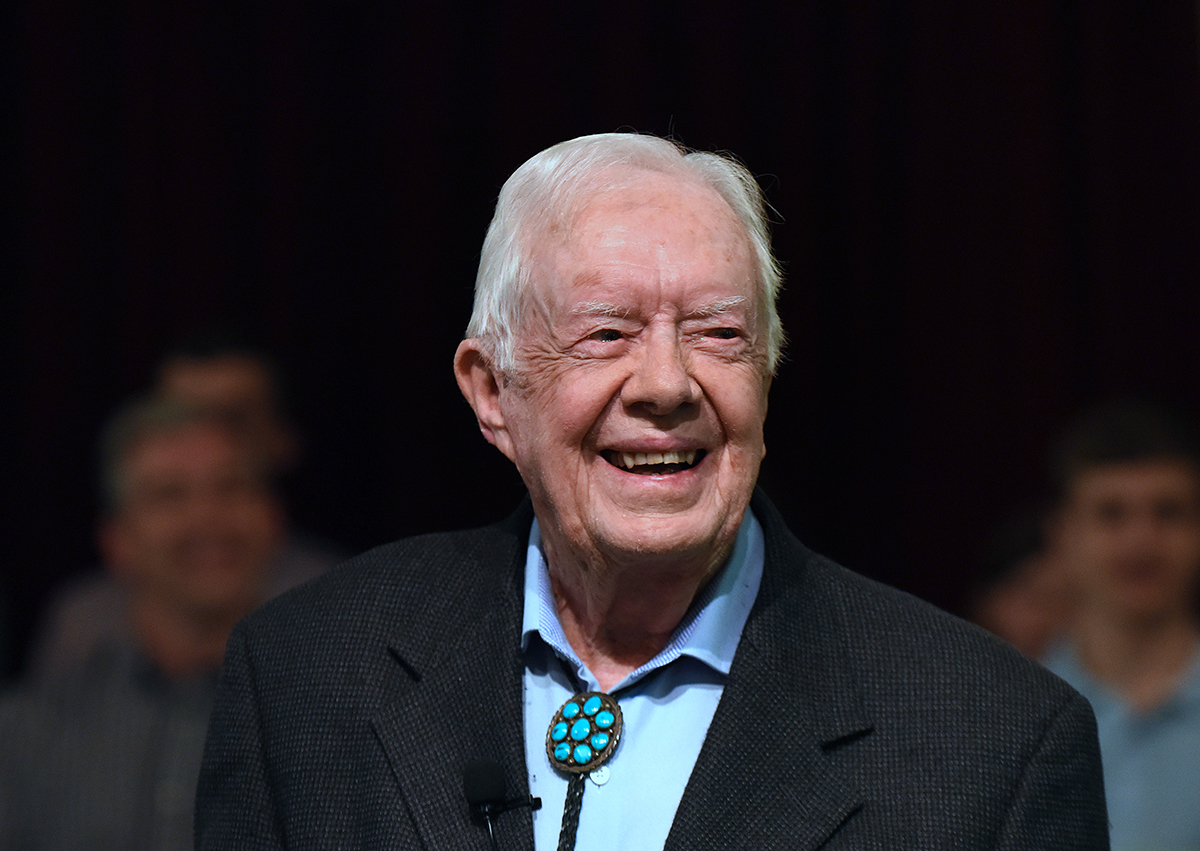Reaching Milestones After Cancer
- Former President Jimmy Carter, 98, and his wife Rosalyn, 96, were greeted to great applause as they made a rare public appearance at a peanut festival in his Georgia hometown.
- The moment for the beloved couple comes as the former president is in his seventh month of hospice care and less than a week from his 99th birthday.
- A resilient Jimmy Carter was diagnosed with metastatic melanoma in 2015. Melanoma is a form of skin cancer that starts in the same cells that give your skin, hair, and eyes their color. It also can spread to other parts of the body if left untreated. Carter’s cancer had spread to his liver and brain. He was treated with immunotherapy, a cancer treatment that uses the body’s immune system to target cancer cells.
- Jimmy Carter has been under hospice care since February and remains in good spirits, according to his family. Meanwhile, Rosalynn is living with dementia, which impacts her cognitive ability.
- Palliative care can involve a range of tactics to provide comfort and symptom relief. Hospice care usually refers to the final chapter of cancer when all treatment efforts have been stopped.
Former President Jimmy Carter, 98, made an extraordinary public appearance at a peanut festival amid his ongoing hospice care in his hometown. He was joined by his wife and former First Lady, Rosalynn, 96, who lives with dementia. The beloved couple exemplifies resiliency, true love, and the grace of handling disease in older age.
Read MoreCan y’all see who is in this car? God Bless Former President Jimmy Carter and Former First Lady Carter for making the #plainspeanutfestival parade this year!!! Happy early birthday to him! #JimmyCarter99 pic.twitter.com/fu3vpQcgsb
— Yes. It has two k’s. (@erikka2ks08) September 23, 2023
“God Bless Former President Jimmy Carter and Former First Lady Carter for making the #plainspeanutfestival parade this year!!! Happy early birthday to him! #JimmyCarter99” Williams added to her post.
The resilient couple have defied the odds with their strength and courage to live full and purposeful lives. This past February, Jimmy Carter began hospice care amid ongoing health challenges he’s dealt with for years, including a bout with metastatic melanoma that spread to his brain.
Beautiful day for President & Mrs. Carter to enjoy a ride through the Plains Peanut Festival! And just a week before he turns 99.
We’re betting peanut butter ice cream is on the menu for lunch!#JimmyCarter99 https://t.co/c3b9OqzjXU
— The Carter Center (@CarterCenter) September 23, 2023
“Beautiful day for President and Mrs. Carter to enjoy a ride through the Plains Peanut Festival! And just a week before he turns 99. We’re betting peanut butter ice cream is on the menu for lunch!” the Carter Center wrote in a social media post recognizing the joyous moment.
X users chimed in, showering the Carters with adoration and early birthday wishes.
“They are simply cute 98/96,” X user Samantha Sherwin wrote.
“Omg, this is incredible to see. Happy #99th birthday, Mr. Carter,” X user Alex wrote.
“Bless the Carters and their decades of selfless service. Georgia is lucky to call you our own!!” another X user wrote.
This year has been one to remember for the Carters and their family. Although the former President began hospice care, which focuses on comfort rather than seeking a cure, and Mrs. Carter was diagnosed with dementia, the beloved duo celebrated their 77th wedding anniversary this past summer, marking the longest-married couple in U.S. presidential history according to WMAZ news.
Former peanut farmer and president will turn 99 on October 1. The Carter Center is accepting birthday messages, memories, and tributes from the public, which will be featured in a digital mosaic for the Carters and their families.
My grandfather’s legacy is all the personal stories and memories from the people he has impacted all over the world,” said Jason Carter, Chair of the Carter Center’s Board of Trustees, in a statement.
“The mosaic serves as a gift from this community, and we are excited to share it on his birthday,” Jason Carter added.
Carter’s Legacy and Cancer Journey
Jimmy Carter served as President of the United States from 1977 to 1981. His presidency faced several challenges domestically and abroad, including an energy crisis and mounting issues in the Middle East. The Iranian hostage crisis influenced his defeat of President Ronald Reagan. During the crisis, Carter tried to secure the safe return of hostages.
Jimmy Carter is the longest-lived American president whose legacy became more adored in the five decades since he left the White House. He has been a longtime advocate for democracy, public health, and human rights and was awarded a Nobel Peace Prize. However, amid those accolades, Carter also successfully overcame health challenges that helped grant him the blessing of celebrating 77 years of marriage to the former first lady.

This past February, The Carter Center said the former President “decided to spend his remaining time at home with his family and receive hospice care instead of additional medical intervention.”
“Hospice care focuses on the care, comfort, and quality of life of a person with a serious illness who is approaching the end of life,” the National Institute of Health (NIH) explains.
Hospice care provides comfort care but does not attempt to cure the illness. Families facing potential hospice care should talk to their care team early enough before pursuing hospice care to take advantage of its comforts.
“Starting hospice early may be able to provide months of meaningful care and quality time with loved ones,” the NIH says.
During palliative care, the patient is provided specialized medical care as they manage symptoms associated with their medical condition. This form of care may also provide treatment “intended to cure” the illness as opposed to hospice care, which does not.
“It’s not the same thing as hospice. It’s really important to recognize that palliative care, whether provided by your oncologist or by a specialty palliative care team, is an important adjunct to your oncologic care,” Dr. Lisa Diver, a gynecologic oncologist and Medical Director at ImmunoGen, tells SurvivorNet.
“It doesn’t mean that your doctor is going to stop treatment or even wants to talk about that, but simply that he or she thinks it’s important to support all aspects of your health. That could be pain control, [relief for] nausea or constipation, or mental health care. All these other symptoms that commonly arise and are intertwined inextricably with your cancer care,” Dr. Diver added.

While the scope of President Carter’s health when he began hospice care is unclear, he’s had several health scares over the years.
Carter underwent elective surgery at Emory University Hospital in Atlanta, Georgia, “to remove a small mass in his liver” in August 2015. The operation was successful, but it also revealed he had cancer that had spread or metastasized to other parts of his body. He received care for his metastatic melanoma at Emory’s Winship Cancer Institute.
Melanoma starts in the same cells that give your skin, hair, and eyes their color. Only, in melanoma, the cells change in a way that makes them able to spread to other organs. While it’s mostly found on areas of your skin exposed to the sun, it can also develop in areas that rarely receive sun rays. These areas may include the palms of your hands, soles of your feet, your eyes, inside your mouth, and under your nails.
“At the time, Carter thought he might have only weeks to live, but Winship doctors quickly developed a treatment plan for him, beginning with stereotactic radiation to control metastatic tumors in his brain and a new immunotherapy drug that worked systemically,” a statement from the Cancer Institute reads.
During a press conference before his first radiation treatment, the former president clarified that his melanoma had spread to his liver and brain and would have four rounds of the immunotherapy drug pembrolizumab(brand name Keytruda) at three-week intervals.
Immunotherapy drugs work by activating immune cells against cancerous cells using the body’s ability to fight off the cells. Immunotherapy drugs are used for many types of cancer, including melanoma, bladder, colorectal, lung, blood, pancreatic, and breast cancer, among others.
WATCH: Immunotherapy and checkpoint inhibitors.
Carter’s drug Keytruda is a type of immunotherapy called a checkpoint inhibitor, which works by interfering with signaling pathways between T cells and cancer cells and prevents cancer cells from hiding from the body’s T cells. More specifically, Keytruda works by essentially taking the brakes off the immune system to allow the body’s T-cells to do what they are meant to do: fight off invaders or abnormal cells like cancer cells, among other things.
“I’ve had melanoma patients early on who, many years ago, wouldn’t have had a chance,” Dr. Scott Strome explains to SurvivorNet.
Dr. Strome is the Chair of the Department of Otorhinolaryngology Head & Neck Surgery at the University of Maryland School of Medicine. He stresses the incredible impact and adds hope immunotherapy and checkpoint inhibitors have had on melanoma patients.
“[Melanoma patients who] come back to my clinic now, I can’t say cured of their disease, that’s probably the wrong term, but they’re alive, and they don’t have really any evidence of disease that we can tell. That’s the greatest feeling that you can have as a doctor,” Dr. Strome added.

The former president reportedly announced to his church in March 2016 that doctors stopped his treatment after seeing no more signs of tumors. Then, in 2019, Carter had surgery to relieve pressure on his brain caused by bleeding from his multiple falls at home.
Since February, President Carter has received hospice care, meaning his doctors stopped medical intervention for any ongoing ailments. During an interview with the Associated Press in May, Carter’s grandson Jason Carter said Jimmy and Rosalynn have been together at their home.
“Their faith is really grounded in this moment. In that way, it’s as good as it can be,” Jason Carter said.
The former president still follows the public discussion and receives updates on the humanitarian work the Carter Center is doing.
Questions for Your Doctor
Whether you are in the middle of your cancer journey or caring for a loved one, asking questions about late-stage care can be helpful. To help you begin your conversation, consider the following questions.
- How will I know if I need palliative care to aid my cancer treatment?
- How does palliative care differ from the care I’m getting now?
- Who provides palliative care?
- Will my insurance cover palliative care?
Is there a moment when palliative care becomes hospice care?
Learn more about SurvivorNet's rigorous medical review process.

